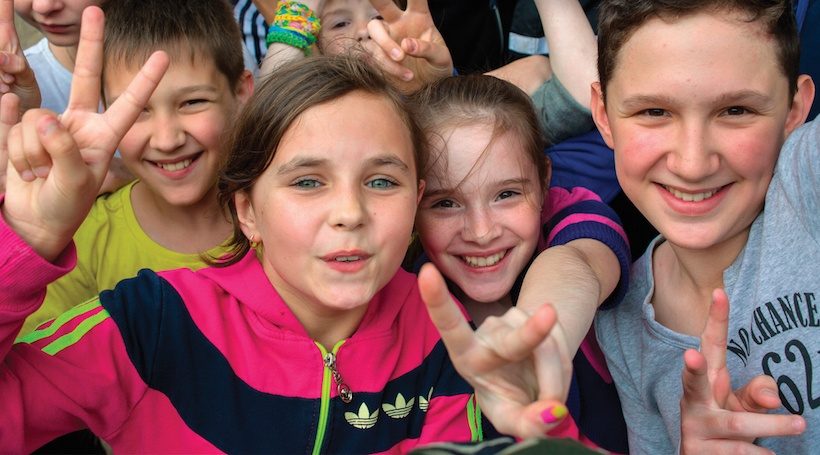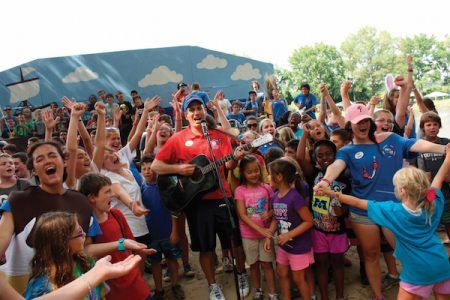Photos courtesy of Liberty Lake Day Camp
Smart parents know the perfect time to plan your child’s summer fun is right now – and yes, we’re well aware it’s freezing outside. But many camps will open registration soon (if they haven’t already), so get researching to find the camp that is sure to make this your child’s best summer ever.
Step 1: Match your child’s interests
SJ has so many types of summer camps that the choices may seem endless. But which one is the perfect match for your child? No need to worry, there’s a summer camp for every child.
“There’s something for everyone, particularly in South Jersey,” says Danielle Wiest, the executive director of Child Care and Camp at the YMCA of Burlington and Camden Counties. “There are hundreds of day camps around here.”
While searching for the right camp for your child, Wiest says to consider their interests. “Think about what the program offers and if that matches your child’s personality. It might be really convenient to go to computer camp, but if your child is into sports, it’s worth the extra five-minute drive.”
And if you have a blossoming Broadway buff, an acting or dance camp might be the best fit, while kids looking to run the world might enjoy leadership camps. Regardless of the type of camp, make sure the program offers campers an educational experience they can mature from, not just a playground or a pool. The point of sending your children to camp, says Andy Pritikin, owner and director of Liberty Lake Day Camp in Bordentown, is to help them grow and explore their interests.
 Step 2: Decide on day or overnight
Step 2: Decide on day or overnight
Not every child is ready to spend nights away from mom and dad – and that’s OK. The American Camp Association recommends waiting until your child is at least 8 years old for overnight camps, unless the child has had plenty of positive experiences being away from home.
And while your child might seem hesitant about overnight camp, don’t immediately rule it out. Pritikin says his father sent him to a two-week, overnight camp when he was 12, and at first, he didn’t want to go.
“It turned out to be the best two weeks of my life,” he says. “Summer camp can be one of your child’s greatest childhood experiences. There’s something we call camp magic, because campers feel a sense of community and spirit. There’s nothing like it.”
Pritikin says that kids can surprise themselves in how much they enjoy an overnight camp. “They learn to make friends and interact with each other. This is a lifelong skill that they will benefit from in years to come.”
But for kids who aren’t comfortable with an overnight camp, day camp is perfectly fine. It will help them get used to the idea of overnight camp for the following summer.
“There is no right age for camp,” Pritikin says. “It’s more about what’s right for the individual child. If your child isn’t ready, don’t send them.”
Step 3: Don’t ignore simple play
Plenty of educators say today’s kids are overscheduled and overworked, so summer camp can be a great place to allow for a little down time (or a lot). A camp that offers opportunities for simple fun may be exactly what your child needs.
“Children who are not encouraged to play – or choose not to – have less energy, less interest and less enthusiasm about life,” says Pritikin. “And I’m not talking about playing video games in the basement. I’m talking about hand-to-hand, face-to-face, old-school, getting dirty, scraping your knee, hurting your feelings, real stuff that helped shape us into the adults that we are today.”
Pritikin stresses that play has many benefits. “It teaches young people how to learn, and gives the skills of persistence, grit, participation, failure, encouragement and perseverance. Play is a process of experimenting and redefining important life lessons – a form of self-regulation. It sets a foundation for personal mastery.”
Step 4: Attend an open house
Before committing to a camp that seems like a good fit for your family, visit and talk to the staff. Most summer camps offer open houses for parents and kids in the spring, so start planning your visit now.
Once there, ask about the training and backgrounds of the counselors and director. Also find out the counselor-to-camper ratio. Touring the grounds and learning about the camp’s programs can ease last-minute doubts you and your child might have.
“You’ll get a general feel for the organization, like if the staff seemed open and friendly and if they were willing to answer your questions,” Wiest says. “Most camps will also give out a parent handbook with their policies so you can take a look ahead of decision time.”
As a parent, you can also find out important information, like if you’ll be notified if another child in the program has a stomach bug so you can keep an eye on your own camper. You’ll also be able to find out what happens if your child becomes sick or injured, if the program is allergy-friendly and other important health-related issues that you will want to know before you commit.
 Step 5: Register, pack – and get excited!
Step 5: Register, pack – and get excited!
Once you’ve selected your child’s camp, take time to help your child get ready for the summer experience.
If your child is going to an overnight camp, start preparing several weeks before the first day. Ask the camp for an activity calendar, so you will know what kind of clothes or accessories to pack.
Make a checklist (your camp may even have one) and keep checking that you have everything. Don’t forget to involve your camper by packing together or writing a list of questions for the camp counselors. Making them part of the process will help your child stay excited about going to camp.
Many camps will let you visit the day before camp starts. Use this trip as the final opportunity to make your child feel comfortable – and excited – about going to camp. And if your child has medical needs, be sure to contact the camp nurse at least one week before camp starts.
Spend plenty of time discussing with your child his expectations of summer camp. Stress the positives of camp: new friends, outdoor games and friendly counselors.
“Bottom line is,” says Pritikin, “you want to find a camp that keeps your child happy and safe. But you also
want your child to come home having grown.”
Camp Considerations
Be sure you know the answers to these questions before selecting a camp for your child.
✗ What is the counselor-to-camper ratio?
✗ What is the camp’s philosophy?
✗ What is the camp director’s background?
✗ How are behavioral problems handled?
✗ What training do counselors receive?
✗ What percentage of counselors returned from last year?
✗ Can parents visit the camp?
Source: American Camp Association
Camp Directory
Camp Ockanickon
1303 Stokes Road, Medford
609-654-8225
ycamp.org
Early Childhood Camps at the Katz JCC
1301 Springdale Road,
Cherry Hill
856-424-4444, ext. 1242
katzjcc.org/ecccamps
Gymnastics and Cheerleading Academy
5 Larwin Road, Cherry Hill
856-795-4599
thegcacademy.com
Haddonfield Friends School Summer Camp
47 North Haddon Avenue,
Haddonfield
856-429-6786
haddonfieldfriends.org
ISC Summer Day Camp
650 Kresson Road, Cherry Hill
856-428-8588
isccherryhill.com
JCC Camps at Medford
400 Tuckerton Road, Medford
856-671-1666
jcccampsatmedford.org
Liberty Lake Day Camp
1195 Florence Columbus Road,
Bordentown
609-499-7820
libertylakedaycamp.com
Tall Pines Day Camp
1349 Ames Road,
Williamstown
856-262-3900
tallpinesdaycamp.com
YMCA of Burlington and Camden Counties
Summer Day Camps
856-231-9622, ext. 308
ymca-bc.org



 Step 2: Decide on day or overnight
Step 2: Decide on day or overnight Step 5: Register, pack – and get excited!
Step 5: Register, pack – and get excited!









